-
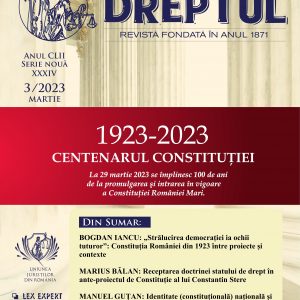
-
 The foundations of European Union law lie in the reasons that European decision-makers have identified, after the two World Wars, firstly, for the establishment of the European Coal and Steel Community and then of the European Economic Community and the European Atomic Energy Community. These reasons, however, find their origins in the events that essentially marked the first half of the 20th century, identifying themselves, among other things, through the developments recorded by the international society, namely the international law, in general, evolutions which the European society, and, implicitly, the European Union law, would not have been possible to avoid.
The foundations of European Union law lie in the reasons that European decision-makers have identified, after the two World Wars, firstly, for the establishment of the European Coal and Steel Community and then of the European Economic Community and the European Atomic Energy Community. These reasons, however, find their origins in the events that essentially marked the first half of the 20th century, identifying themselves, among other things, through the developments recorded by the international society, namely the international law, in general, evolutions which the European society, and, implicitly, the European Union law, would not have been possible to avoid. -
 PPPs, structured under Project Finance Standards, form a system determined by a normative complex organized by subsystems and interacting and interdependent elements conditioned by a process of control and communication. This systematic nature has an effect on the legal configuration of the content of the PPP contract. It was shown that financing depends, on the one hand, on budgets that condition it and, on the other, it acts as a determinant of other elements of the system, so that there is a close relationship between the financing of the project and the challenge of contractual management. The correspondence between the components of the project finance system is of reciprocal conditioning and is determined by the communication between its parts.
PPPs, structured under Project Finance Standards, form a system determined by a normative complex organized by subsystems and interacting and interdependent elements conditioned by a process of control and communication. This systematic nature has an effect on the legal configuration of the content of the PPP contract. It was shown that financing depends, on the one hand, on budgets that condition it and, on the other, it acts as a determinant of other elements of the system, so that there is a close relationship between the financing of the project and the challenge of contractual management. The correspondence between the components of the project finance system is of reciprocal conditioning and is determined by the communication between its parts. -
 Electoratul este o funcțiune politică, iar nu un drept. Indivizii au un drept anterior legei pozitive, și anume acela de a fi considerați ca cetățeni politici sau, cum spune Aristot, „omul este un animal social”, zoon potitikon1. Începând dela germanul Altusius, după cum stabilește Gierke, și până în timpurile noastre, doctrinarii politici consideră pe individ ca făcând parte integrantă din marele suveran, consideră voința lui ca alcătuind voința colectivă a corpului social, numit Stat. Locke, Rousseau, Blakstone, Barclay, Loyseau și alți cugetători, fiecare cu elementele ce le sunt personale, au format școală, și un corp de doctrină, susținut de o literatură vastă, întemeiază dreptul primar al indivizilor pe conceptul suveranităței legale. Suveranitatea, în accepțiunea ei juridică, „dă, după Esmein, opiniunei publice o forță superioară, o expresie precisă, o valoare juridică, o autoritate legală”.
Electoratul este o funcțiune politică, iar nu un drept. Indivizii au un drept anterior legei pozitive, și anume acela de a fi considerați ca cetățeni politici sau, cum spune Aristot, „omul este un animal social”, zoon potitikon1. Începând dela germanul Altusius, după cum stabilește Gierke, și până în timpurile noastre, doctrinarii politici consideră pe individ ca făcând parte integrantă din marele suveran, consideră voința lui ca alcătuind voința colectivă a corpului social, numit Stat. Locke, Rousseau, Blakstone, Barclay, Loyseau și alți cugetători, fiecare cu elementele ce le sunt personale, au format școală, și un corp de doctrină, susținut de o literatură vastă, întemeiază dreptul primar al indivizilor pe conceptul suveranităței legale. Suveranitatea, în accepțiunea ei juridică, „dă, după Esmein, opiniunei publice o forță superioară, o expresie precisă, o valoare juridică, o autoritate legală”. -
 The new Romanian Civil Code (entered into force as of 1 October 2011, in Art. 1368 (1) provides that “the lack of judgement does not exempt the author of the prejudice from the payment of a compensation to the victim as many times as the person who, according to the law, was entitled to supervise them, cannot be made liable”. Against certain opinions expressed in the doctrine, the author believes that the foundation of such a liability is exclusively the equity, not a form of civil liability.
The new Romanian Civil Code (entered into force as of 1 October 2011, in Art. 1368 (1) provides that “the lack of judgement does not exempt the author of the prejudice from the payment of a compensation to the victim as many times as the person who, according to the law, was entitled to supervise them, cannot be made liable”. Against certain opinions expressed in the doctrine, the author believes that the foundation of such a liability is exclusively the equity, not a form of civil liability. -
 In this paper the author makes an analysis of the provisions relating to „Aggravated theft” (Article 229 of the Criminal Code), from the perspective of the comparative law and of the requirements of the principle of legality. There are emphasized a series of errors produced during the drafting of the text (setting an excessively large number of circumstantial elements, their arbitrary grouping, etc.) and, at the same time, there are presented some solutions to overcome the deficiencies.
In this paper the author makes an analysis of the provisions relating to „Aggravated theft” (Article 229 of the Criminal Code), from the perspective of the comparative law and of the requirements of the principle of legality. There are emphasized a series of errors produced during the drafting of the text (setting an excessively large number of circumstantial elements, their arbitrary grouping, etc.) and, at the same time, there are presented some solutions to overcome the deficiencies. -
 In this article, the author presents the foundation of criminal substantive law of the safety measure of special confiscation, which concerns the category of goods obtained from committing criminal acts, as well as of the safety measure of extended confiscation, in both situations the analysis being focused on the assumption that the goods have been alienated by the defendant and they have ended up in the patrimony of other persons. Further on, it is made an analysis of criminal procedural law of the situation of the persons – other than the defendant – whose goods are subject to confiscation in the course of the trial. From the perspective of guaranteeing the right to a fair trial for these persons, the author detects a series of problems of interpretation or even of legislative gaps. Finally, there is a conclusive chapter of the article accompanied by de lege ferenda proposals corresponding to the criticism which the author has developed and argued by reference to the current legal texts.
In this article, the author presents the foundation of criminal substantive law of the safety measure of special confiscation, which concerns the category of goods obtained from committing criminal acts, as well as of the safety measure of extended confiscation, in both situations the analysis being focused on the assumption that the goods have been alienated by the defendant and they have ended up in the patrimony of other persons. Further on, it is made an analysis of criminal procedural law of the situation of the persons – other than the defendant – whose goods are subject to confiscation in the course of the trial. From the perspective of guaranteeing the right to a fair trial for these persons, the author detects a series of problems of interpretation or even of legislative gaps. Finally, there is a conclusive chapter of the article accompanied by de lege ferenda proposals corresponding to the criticism which the author has developed and argued by reference to the current legal texts. -
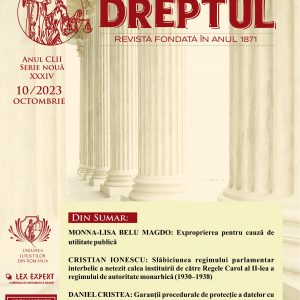
-
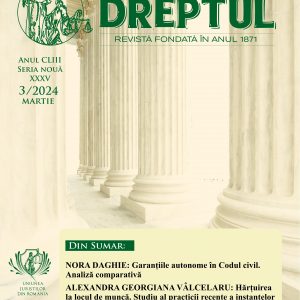
-
 Intimately linked to the concept of sustainable development, the theory that future generations are the subject of law has aroused lively discussions at doctrinal level, at home and abroad. There are also international conferences: e.g. the Stockholm Conference of 1972, which for the first time warned of the future of humanity itself, as a result of environmental deterioration, following human activities; The Brundtland report of the World Commission for Environment and Development appeared in 1987, entitled „our common future”. The EU’s interest, in which Romania is a member state, in sustainable development has grown in parallel with the United Nations initiative for this concept and has resulted in a number of environmental action programs and strategies that have led to the development of numerous acts to translate them into practice, because everything has become or must became „sustainable” – economy, transport, industry, energy, consumption, agriculture.
Intimately linked to the concept of sustainable development, the theory that future generations are the subject of law has aroused lively discussions at doctrinal level, at home and abroad. There are also international conferences: e.g. the Stockholm Conference of 1972, which for the first time warned of the future of humanity itself, as a result of environmental deterioration, following human activities; The Brundtland report of the World Commission for Environment and Development appeared in 1987, entitled „our common future”. The EU’s interest, in which Romania is a member state, in sustainable development has grown in parallel with the United Nations initiative for this concept and has resulted in a number of environmental action programs and strategies that have led to the development of numerous acts to translate them into practice, because everything has become or must became „sustainable” – economy, transport, industry, energy, consumption, agriculture. -
 The new regulation pertaining to business administration in the new Romanian Civil Code, much more detailed than the previous one, springs from the Civil Code of Québec. In Québec, the relevant legal framework provides for an original configuration of this source of obligations, imposing on it the condition of opportunity of the administration actions initiated by the administrator. Subject to this regulation are also the effects of inopportune administration, which aims at restoring the advantage brought to the person administered, without stating the legal grounds of such obligation, aspect which triggers questions to which this paper intends to answer, visiting, among others, other codification proposals on the law of obligations and relevant doctrine in this matter. At the same time, a theoretical definition is laid down for business administration, more nuanced than those elaborated after the new Romanian Civil Code has taken effect, definition which tends to be closer to the meaning of the new normative provisions.
The new regulation pertaining to business administration in the new Romanian Civil Code, much more detailed than the previous one, springs from the Civil Code of Québec. In Québec, the relevant legal framework provides for an original configuration of this source of obligations, imposing on it the condition of opportunity of the administration actions initiated by the administrator. Subject to this regulation are also the effects of inopportune administration, which aims at restoring the advantage brought to the person administered, without stating the legal grounds of such obligation, aspect which triggers questions to which this paper intends to answer, visiting, among others, other codification proposals on the law of obligations and relevant doctrine in this matter. At the same time, a theoretical definition is laid down for business administration, more nuanced than those elaborated after the new Romanian Civil Code has taken effect, definition which tends to be closer to the meaning of the new normative provisions. -
 Given the fact that, in accordance with the Community relating provisions, the new regulation of public utilities provides optimal conditions for the organization, functioning and operation of these services, respectively for delegation of these services’ management to private operators, this study aims at analyzing the manner the public utilities are managed by delegating the management of these services from the territorial administrative units to the authorized private operators.
Given the fact that, in accordance with the Community relating provisions, the new regulation of public utilities provides optimal conditions for the organization, functioning and operation of these services, respectively for delegation of these services’ management to private operators, this study aims at analyzing the manner the public utilities are managed by delegating the management of these services from the territorial administrative units to the authorized private operators. -
 In this study, the author stresses the need to take into account the gravity of the crime committed for punishment individualization, as the gravity of the crime and the punishment are connected by an inseparable nexum, both in the abstract formulation of criminal norm – not being able to imagine the description of a deed in a norm without punishment or vice versa – and in social consciousness, always linking the punishment to the gravity to the crime, in a relationship of cause and effect. However, the author reveals and performs an extensive research of the elements actually serving in the assessment of the gravity of the crime. Thus, in order to know the gravity of the crime committed, one must assess the specific nature and particularities of the specific legal object, the character and importance of the physical or intangible object injured or endangered by committing the crime, the way the action or inaction which constitutes the material element of the offense was performed, the nature and gravity of its consequences, the way the causality report was described, the shape and degree of culpability, the motive and purpose and the circumstances of the crime.
In this study, the author stresses the need to take into account the gravity of the crime committed for punishment individualization, as the gravity of the crime and the punishment are connected by an inseparable nexum, both in the abstract formulation of criminal norm – not being able to imagine the description of a deed in a norm without punishment or vice versa – and in social consciousness, always linking the punishment to the gravity to the crime, in a relationship of cause and effect. However, the author reveals and performs an extensive research of the elements actually serving in the assessment of the gravity of the crime. Thus, in order to know the gravity of the crime committed, one must assess the specific nature and particularities of the specific legal object, the character and importance of the physical or intangible object injured or endangered by committing the crime, the way the action or inaction which constitutes the material element of the offense was performed, the nature and gravity of its consequences, the way the causality report was described, the shape and degree of culpability, the motive and purpose and the circumstances of the crime. -
 The first European Treaty, which encouraged the establishment of political groups in the European Parliament, was the Treaty of Maastricht, which established a European Union, signed in 1992 and came into force a year later. Political parties have always played an important role in democratic societies, a role demonstrated by the functioning of the role of a mediator between society and government, which they fulfill. In the European Parliament, political groups are the doctrinal expression of a pan-European cohesion.
The first European Treaty, which encouraged the establishment of political groups in the European Parliament, was the Treaty of Maastricht, which established a European Union, signed in 1992 and came into force a year later. Political parties have always played an important role in democratic societies, a role demonstrated by the functioning of the role of a mediator between society and government, which they fulfill. In the European Parliament, political groups are the doctrinal expression of a pan-European cohesion. -

-
 Potrivit art. 208 alin. (1) C.pen., fapta celui care, în mod repetat, urmărește, fără drept sau fără un interes legitim, o persoană ori îi supraveghează locuința, locul de muncă sau alte locuri frecventate de către aceasta, cauzându-i astfel o stare de temere, se pedepsește cu închisoare de la 3 la 6 luni sau cu amendă. De asemenea, la alin. (2) al aceluiași articol se prevede că efectuarea de apeluri telefonice sau comunicări prin mijloace de transmitere la distanță, care, prin frecvență sau conținut, îi cauzează o temere unei persoane se pedepsește cu închisoare de la o lună la 3 luni sau cu amendă, dacă fapta nu constituie o infracțiune mai gravă.
Potrivit art. 208 alin. (1) C.pen., fapta celui care, în mod repetat, urmărește, fără drept sau fără un interes legitim, o persoană ori îi supraveghează locuința, locul de muncă sau alte locuri frecventate de către aceasta, cauzându-i astfel o stare de temere, se pedepsește cu închisoare de la 3 la 6 luni sau cu amendă. De asemenea, la alin. (2) al aceluiași articol se prevede că efectuarea de apeluri telefonice sau comunicări prin mijloace de transmitere la distanță, care, prin frecvență sau conținut, îi cauzează o temere unei persoane se pedepsește cu închisoare de la o lună la 3 luni sau cu amendă, dacă fapta nu constituie o infracțiune mai gravă. -
 Conform art. 207 alin. (1) C.pr.pen., atunci când procurorul dispune trimiterea în judecată a inculpatului față de care s-a luat o măsură preventivă, rechizitoriul, împreună cu dosarul cauzei, se înaintează judecătorului de cameră preliminară de la instanța competentă, cu cel puțin 5 zile înainte de expirarea duratei acestei măsuri. Apreciem că acest termen trebuie a fi considerat un termen de decădere, pentru a fi în concordanță cu prevederile Constituției României, republicată, iar nerespectarea lui atrage decăderea procurorului din dreptul de a solicita menținerea măsurii preventive (cu notă aprobativă).
Conform art. 207 alin. (1) C.pr.pen., atunci când procurorul dispune trimiterea în judecată a inculpatului față de care s-a luat o măsură preventivă, rechizitoriul, împreună cu dosarul cauzei, se înaintează judecătorului de cameră preliminară de la instanța competentă, cu cel puțin 5 zile înainte de expirarea duratei acestei măsuri. Apreciem că acest termen trebuie a fi considerat un termen de decădere, pentru a fi în concordanță cu prevederile Constituției României, republicată, iar nerespectarea lui atrage decăderea procurorului din dreptul de a solicita menținerea măsurii preventive (cu notă aprobativă). -
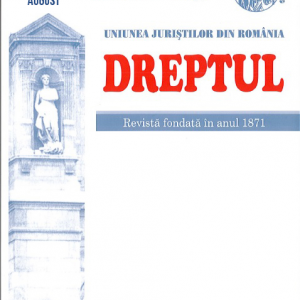 Instanța Curții de Apel Oradea a dispus condamnarea inculpatului pentru săvârșirea infracțiunii de uciderea animalelor, cu intenție, fără drept, prevăzută în art. 25 alin. (1) lit. a) din Legea nr. 205/2004, republicată1, dispunând, totodată, înlăturarea condamnării inculpatului pentru săvârșirea infracțiunii prevăzute în art. 217 alin. 1 din Codul penal anterior (cu notă aprobativă).
Instanța Curții de Apel Oradea a dispus condamnarea inculpatului pentru săvârșirea infracțiunii de uciderea animalelor, cu intenție, fără drept, prevăzută în art. 25 alin. (1) lit. a) din Legea nr. 205/2004, republicată1, dispunând, totodată, înlăturarea condamnării inculpatului pentru săvârșirea infracțiunii prevăzute în art. 217 alin. 1 din Codul penal anterior (cu notă aprobativă). -

-
 Potrivit art. 145 alin. 12 lit. f C.pr.pen., organul judiciar care a dispus mãsura preventivã a obligãrii de a nu pãrãsi localitatea poate impune învinuitului sau inculpatului ca pe durata mãsurii „sã nu exercite profesia, meseria sau sã nu desfãşoare activitatea în exercitarea cãreia a sãvârşit fapta”, şi anume sã nu-şi exercite atribuţiile de primar (cu notã criticã).
Potrivit art. 145 alin. 12 lit. f C.pr.pen., organul judiciar care a dispus mãsura preventivã a obligãrii de a nu pãrãsi localitatea poate impune învinuitului sau inculpatului ca pe durata mãsurii „sã nu exercite profesia, meseria sau sã nu desfãşoare activitatea în exercitarea cãreia a sãvârşit fapta”, şi anume sã nu-şi exercite atribuţiile de primar (cu notã criticã). -
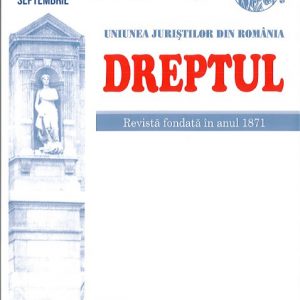 Curtea de Apel Cluj a dispus respingerea apelului inculpatului prin care acesta a solicitat achitarea pentru infracțiunea de vătămare corporală gravă în varianta alternativă a producerii consecinței de punere în primejdie a vieții persoanei, prevăzută în art. 182 alin. 2 din Codul penal anterior, dispunând, totodată, obligarea apelantului la plata sumei de 500 lei reprezentând cheltuieli judiciare în favoarea statului (cu notă critică).
Curtea de Apel Cluj a dispus respingerea apelului inculpatului prin care acesta a solicitat achitarea pentru infracțiunea de vătămare corporală gravă în varianta alternativă a producerii consecinței de punere în primejdie a vieții persoanei, prevăzută în art. 182 alin. 2 din Codul penal anterior, dispunând, totodată, obligarea apelantului la plata sumei de 500 lei reprezentând cheltuieli judiciare în favoarea statului (cu notă critică). -
 Conform prevederilor art. 396 alin. (6) C.pr.pen., instanța pronunță încetarea procesului penal atunci când există vreunul dintre cazurile prevăzute la art. 16 alin. (1) lit. e)–j) C.pr.pen. Unul dintre aceste cazuri, prevăzut de art. 16 alin. (1) lit. g) teza ultimă C.pr.pen., se referă la situația în care „a fost încheiat un acord de mediere în condițiile legii”. (Curtea de Apel Galați, Decizia penală nr. 1278/A/8.12.2016 dată în Dosarul nr. 1324/233/2016, cu notă aprobativă)
Conform prevederilor art. 396 alin. (6) C.pr.pen., instanța pronunță încetarea procesului penal atunci când există vreunul dintre cazurile prevăzute la art. 16 alin. (1) lit. e)–j) C.pr.pen. Unul dintre aceste cazuri, prevăzut de art. 16 alin. (1) lit. g) teza ultimă C.pr.pen., se referă la situația în care „a fost încheiat un acord de mediere în condițiile legii”. (Curtea de Apel Galați, Decizia penală nr. 1278/A/8.12.2016 dată în Dosarul nr. 1324/233/2016, cu notă aprobativă) -
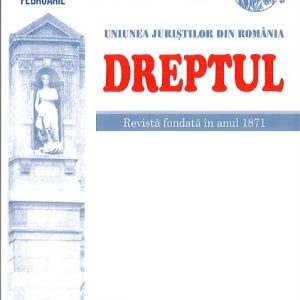 Conform prevederilor art. 342 C.pr.pen., obiectul procedurii camerei preliminare îl constituie, printre altele, verificarea legalității administrării probelor și a efectuării actelor de către organele de urmărire penală. Cu această ocazie, judecătorul de cameră preliminară este obligat să constate toate încălcările legii, săvârșite cu ocazia efectuării urmăririi penale și să sancționeze aceste încălcări, dispunând una dintre soluțiile prevăzute în cuprinsul art. 346 C.pr.pen.
Conform prevederilor art. 342 C.pr.pen., obiectul procedurii camerei preliminare îl constituie, printre altele, verificarea legalității administrării probelor și a efectuării actelor de către organele de urmărire penală. Cu această ocazie, judecătorul de cameră preliminară este obligat să constate toate încălcările legii, săvârșite cu ocazia efectuării urmăririi penale și să sancționeze aceste încălcări, dispunând una dintre soluțiile prevăzute în cuprinsul art. 346 C.pr.pen. -
 Examinând conținutul unei hotărâri pronunțate în cadrul regulatorului de competență în cazul unui conflict negativ de competență, se constată că aceasta nu soluționează fondul unei cauze, ci doar un incident procesual în care stabilește care din cele două instanțe va trebui să judece, potrivit dispozițiilor legale. Cum, în cazul analizat, titularul sesizării solicită interpretarea unor dispoziții procedurale în scopul determinării instanței competente teritorial să judece o cerere de încuviințare a executării silite imobiliare, se constată că stabilirea competenței nu reprezintă o chestiune de care să depindă soluționarea pe fond a cauzei. În consecință, se constată că mecanismul de unificare a practicii judiciare reglementat de dispozițiile art. 519 și următoarele din Codul de procedură civilă nu poate fi uzitat atât timp cât legiuitorul a limitat, prin condiția restrictivă de admisibilitate analizată, rolul unificator al instituției juridice a hotărârii prealabile numai chestiunilor de drept care conduc la dezlegarea în fond a cauzei sub aspectul statuării în privința raportului juridic dedus judecății. (cu notă critică)
Examinând conținutul unei hotărâri pronunțate în cadrul regulatorului de competență în cazul unui conflict negativ de competență, se constată că aceasta nu soluționează fondul unei cauze, ci doar un incident procesual în care stabilește care din cele două instanțe va trebui să judece, potrivit dispozițiilor legale. Cum, în cazul analizat, titularul sesizării solicită interpretarea unor dispoziții procedurale în scopul determinării instanței competente teritorial să judece o cerere de încuviințare a executării silite imobiliare, se constată că stabilirea competenței nu reprezintă o chestiune de care să depindă soluționarea pe fond a cauzei. În consecință, se constată că mecanismul de unificare a practicii judiciare reglementat de dispozițiile art. 519 și următoarele din Codul de procedură civilă nu poate fi uzitat atât timp cât legiuitorul a limitat, prin condiția restrictivă de admisibilitate analizată, rolul unificator al instituției juridice a hotărârii prealabile numai chestiunilor de drept care conduc la dezlegarea în fond a cauzei sub aspectul statuării în privința raportului juridic dedus judecății. (cu notă critică)
